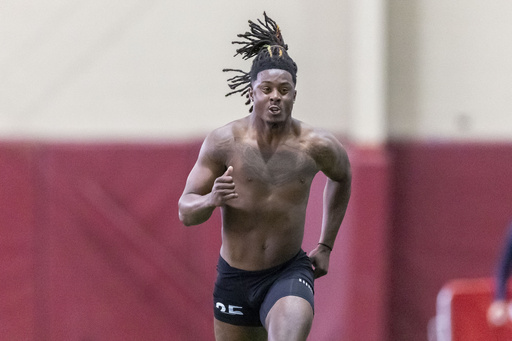The lure of starting a pro career early apparently isn’t quite as tempting for underclassmen now as it was in the days before college stars could profit off their name, image and likeness.
This month’s draft features 58 early entrants, the lowest number of players to enter the draft with college eligibility remaining since 2011. That includes 54 underclassmen who were granted special eligibility by the NFL and four others (Miami defensive back Kamren Kinchens, Alabama defensive back Kool-Aid McKinstry, Texas defensive tackle Byron Murphy and Clemson running back Will Shipley) who earned their degrees in three years.
That represents a dramatic shift, considering at least 100 underclassmen entered the draft ever year from 2016 to 2022. The 2021 draft had a record 100 underclassmen selected.
“I wouldn’t be surprised if those numbers drop even more next year,” Detroit Lions general manager Brad Holmes said.
The NIL policy change for college athletes took effect in the summer of 2021. The next year, 100 underclassmen entered the draft, down from 128 the previous year. That number dropped to 82 last year and tumbled again this year.
“Some of these guys that are out now didn’t come out a year ago because they were enticed to go back for NIL money,” Buffalo Bills general manager Brandon Beane said.
Those NIL opportunities didn’t sway every underclassman who was thinking of leaving school early.
Wisconsin running back Braelon Allen had arrived on campus planning to turn pro after three seasons. He said at Wisconsin’s pro day event that NIL possibilities gave him “zero” reason to rethink that plan.
But it did play a role for other players such as Michigan offensive lineman Zak Zinter, who didn’t enter last year’s draft and instead stayed for his senior season and helped the Wolverines win a national title.
“It’s good to not worry about stuff money-wise while you’re here playing ball and to get paid to do what you love,” Zinter said. “Nothing crazy, but it just definitely was a factor we talked about.”
The fallout from the lack of underclassmen won’t be evident early in the draft. The first round traditionally is heavy on early entries, and that isn’t likely to change this year.
The latest Associated Press mock draft has underclassmen getting selected with 19 of the 32 first-round picks, including eight of the top 10 selections. Twenty-five of the 30 top-10 selections over the last three drafts have been early entrants.
The question is whether the lack of underclassmen will limit teams’ choices when they get into the later rounds.
“I still think there’s more depth at some positions than others but I think there’s going to be a good pool,” Beane said. “I don’t see right now, like all of a sudden you get to a certain round on day three and you’re like, ‘You know, there’s nothing to pick from.’”
While this draft doesn’t have as many younger prospects as usual, it does have more rookies approaching their mid-20s than normal, continuing a trend that started well before this year.
The NCAA granted players who were in college during the pandemic-shortened 2020 season the opportunity for an extra year of eligibility. The age of the players who capitalized on that throws a wrinkle into the evaluation process.
“We don’t really go into looking as a vacuum, so let’s take age specifically,” Cleveland Browns general manager Andrew Berry said. “It’s not like, ‘OK, hey, if you’re X years old you’re off the board or we’re not going to consider you.’ Really we do try and take each player individually and consider all the circumstances, risk factors, things that make that prospect unique and ultimately place a value on that individual from there.”
The impact is most obvious at the quarterback position. For instance, Green Bay Packers quarterback and 2023 fifth-round pick Sean Clifford was 25 when he began his first NFL training camp. Clifford is actually 3 1/2 months older than Packers starter Jordan Love, who was drafted three years earlier.
Notre Dame’s Sam Hartman, a possible late-round pick, will be 25 when the NFL season starts. Oregon’s Bo Nix and Tennessee’s Joe Milton are both 24. Washington’s Michael Penix Jr. and Florida State’s Jordan Travis turn 24 next month.
But there are some unusually older draft prospects at other positions as well. Minnesota tight end Brevyn Spann-Ford and Florida State defensive lineman Braden Fiske are both 24.
Fiske said he has pitched his maturity as an asset when he has spoken to NFL teams.
“I treat it like a pro and that’s how it’s going to be when I get to the next level,” said Fiske, who spent five seasons at Western Michigan before transferring to Florida State. “There’s not going to be any questions of can I handle the pressures at the next level. There’s not going to be any questions of can I handle the long days, the film, everything that goes into it.
“This is something I’ve been doing for a long time, and I’ve been able to handle it up to this point, and I think I’m ready to play at a high level and continue the success.”
Future drafts eventually will stop having those older prospects as the college players who were on campus during the pandemic finally exhaust their eligibility.
But the shortage of underclassmen figures to be something NFL teams will have to continue dealing with as long as NIL remains a factor.
“That drop in numbers (is) not a surprise,” Holmes said. “And I don’t really foresee it changing anytime soon.”
___
AP Sports Writers Larry Lage and Michael Marot contributed to this report.
___
AP NFL: https://apnews.com/hub/nfl



